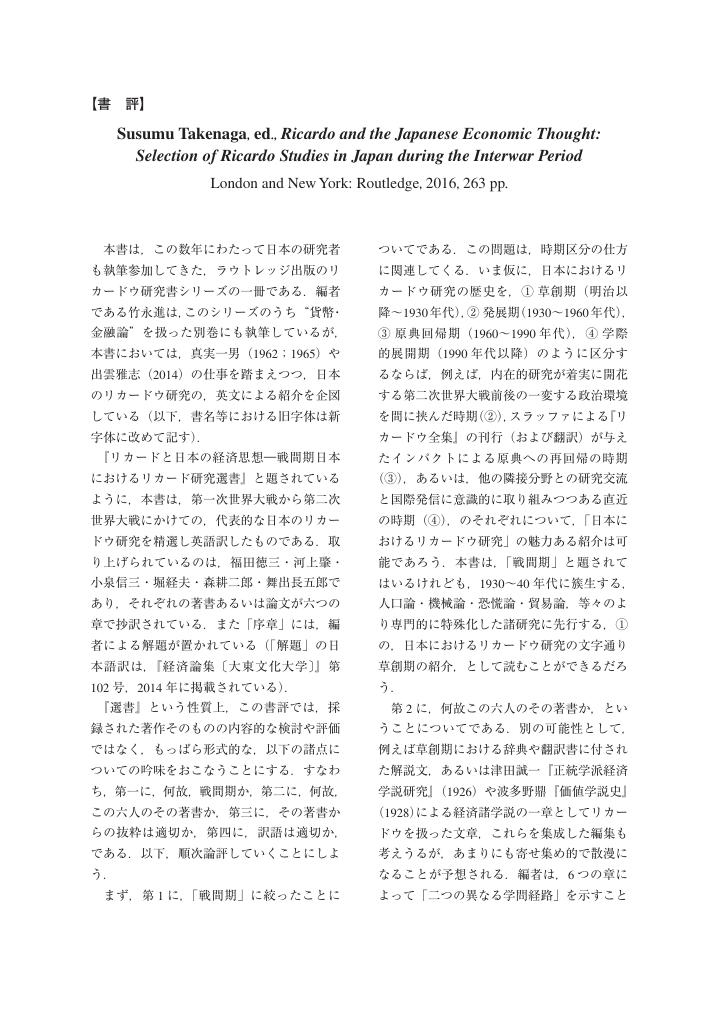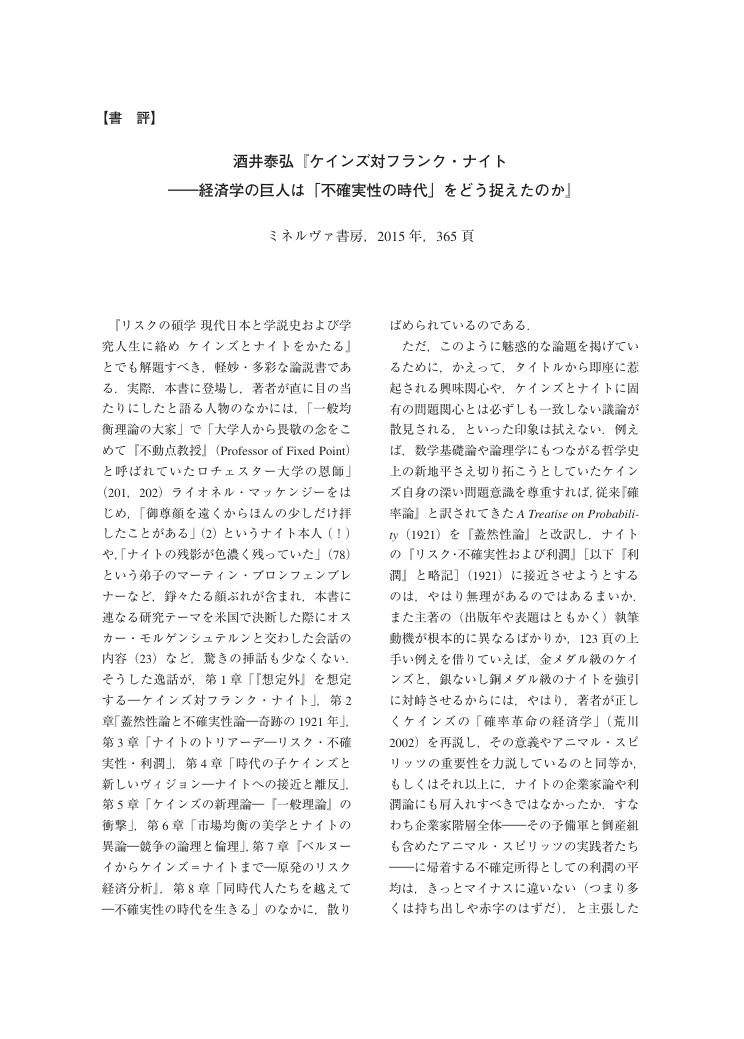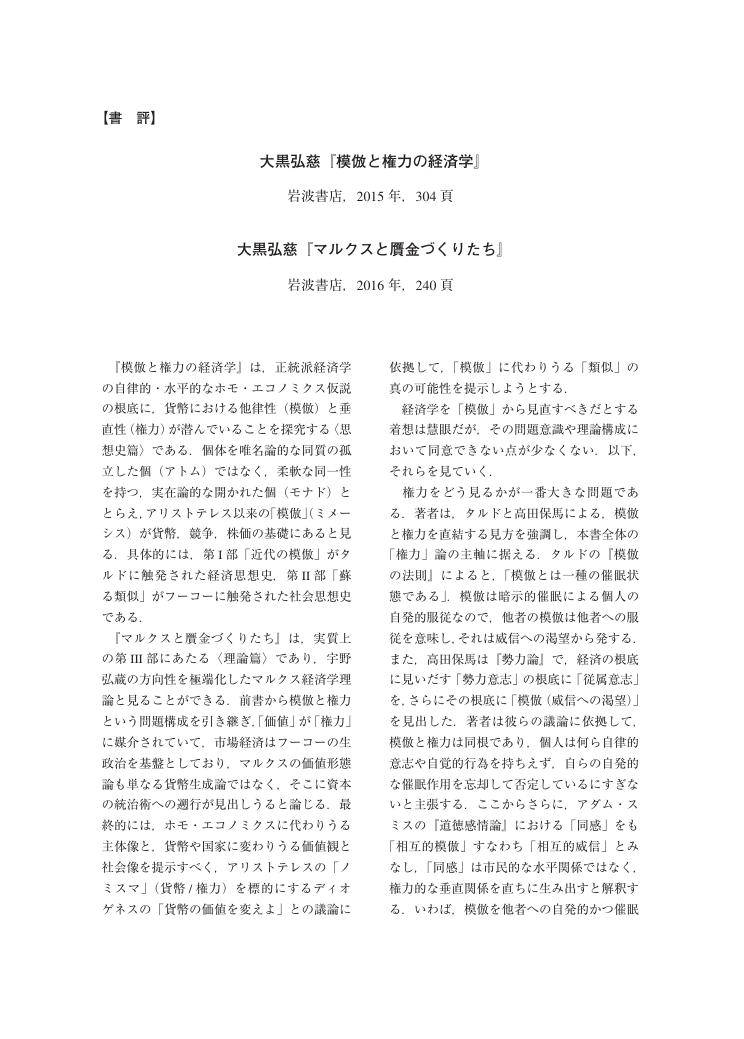- 著者
- 安藤 隆穂
- 出版者
- 経済学史学会
- 雑誌
- 経済学史研究 (ISSN:18803164)
- 巻号頁・発行日
- vol.59, no.1, pp.95-98, 2017 (Released:2019-09-01)
- 著者
- 小林 純
- 出版者
- 経済学史学会
- 雑誌
- 経済学史研究 (ISSN:18803164)
- 巻号頁・発行日
- vol.59, no.1, pp.99-100, 2017 (Released:2019-10-12)
- 著者
- 木村 雄一
- 出版者
- The Japanease Society for the History of Economic Thought
- 雑誌
- 経済学史研究 (ISSN:18803164)
- 巻号頁・発行日
- vol.59, no.1, pp.101-102, 2017 (Released:2019-10-12)
- 著者
- 武藤 功
- 出版者
- 経済学史学会
- 雑誌
- 経済学史研究 (ISSN:18803164)
- 巻号頁・発行日
- vol.59, no.1, pp.103-104, 2017 (Released:2019-10-12)
- 著者
- 佐藤 滋正
- 出版者
- 経済学史学会
- 雑誌
- 経済学史研究 (ISSN:18803164)
- 巻号頁・発行日
- vol.59, no.1, pp.105-106, 2017 (Released:2019-10-12)
- 著者
- 御崎 加代子
- 出版者
- The Japanease Society for the History of Economic Thought
- 雑誌
- 経済学史研究 (ISSN:18803164)
- 巻号頁・発行日
- vol.59, no.1, pp.107-108, 2017 (Released:2019-10-12)
- 著者
- 若森 章孝
- 出版者
- 経済学史学会
- 雑誌
- 経済学史研究 (ISSN:18803164)
- 巻号頁・発行日
- vol.58, no.2, pp.86-88, 2017 (Released:2019-11-30)
- 著者
- 大田 一廣
- 出版者
- 経済学史学会
- 雑誌
- 経済学史研究 (ISSN:18803164)
- 巻号頁・発行日
- vol.58, no.2, pp.89-91, 2017 (Released:2019-11-30)
- 著者
- 御崎 加代子
- 出版者
- 経済学史学会
- 雑誌
- 経済学史研究 (ISSN:18803164)
- 巻号頁・発行日
- vol.58, no.2, pp.92-94, 2017 (Released:2019-11-30)
- 著者
- 佐々木 憲介
- 出版者
- 経済学史学会
- 雑誌
- 経済学史研究 (ISSN:18803164)
- 巻号頁・発行日
- vol.58, no.2, pp.95-97, 2017 (Released:2019-11-30)
- 著者
- 牧野 邦昭
- 出版者
- The Japanease Society for the History of Economic Thought
- 雑誌
- 経済学史研究 (ISSN:18803164)
- 巻号頁・発行日
- vol.59, no.1, pp.1-20, 2017 (Released:2019-09-01)
Abstract: In order to explore the relationship between war and economics in the era of imperialism and total war, this paper mainly covers Tanzan Ishibashi, a Japanese economic journalist who lat-er became a politician and served as Prime Minister. Ishibashiʼs basic thought consisted of the ʻprinciple of independenceʼ and the ʻprinciple of network.ʼ The latter emphasized production by the division of labor of free agents; con-sumption by transactions between economic agents enabling production; and international peace as a premise of the international division of labor and trade. Therefore, Ishibashi con-sistently advocated for the ʻlittle Japanism,ʼ which opposed imperialism and bloc economies, aiming for peaceful economic development through international trade. However, while Ishibashiʼs arguments regarding lifting the gold embargo and an expan-sionary fiscal policy led to the restoration of the economy at the national level, they also ex-acerbated poor relations with China and the United Kingdom and became a factor behind the Sino-Japanese War and the Pacific War. Moreover, military expenditure-based fiscal expan-sion necessitated a transition to the controlled economy that Ishibashi criticized. Ishibashiʼs arguments thus betrayed his ideals. On the other hand, according his princi-ples, he promoted the institutionalization of economics in wartime by building a personal network, secured freedom of thought and activities through this means, and also used his per-sonal network to create a post-war plan for the world economy based on free trade. Understanding the gap between Ishibashiʼs economic thought and reality, and under-standing his struggles in trying to cross that gap, are important when thinking about a modern society in which protectionism and chauvinism are on the rise as globalization progresses. JEL classification numbers: B 27, B 31, N 45.
1 0 0 0 OA ピグー貿易論におけるマーシャル理論の継承と応用 『財政の研究』に即して
- 著者
- 山本 崇史
- 出版者
- 経済学史学会
- 雑誌
- 経済学史研究 (ISSN:18803164)
- 巻号頁・発行日
- vol.59, no.1, pp.21-42, 2017 (Released:2019-09-01)
Abstract: Pigou actively participated in the tariff reform controversy and contributed to several writings and articles on tariff reform in the early 20th century. In A Study in Public Finance (1st ed. 1928; 3rd ed. 1947), his foreign trade theory was given a new perspective in the form of the theory of tax revenue. Pigouʼs interest in foreign trade is evident in Economics in Practice: Six Lectures on Current Issues (1935) and Alfred Marshall and Current Thought (1953). In these writings, trade balances are the main focus. In view of these activities, it can be inter-preted that Pigou studied foreign trade theory continuously and from the perspective of con-tributing to real economic policies. Pigouʼs foreign trade theory of later years is significant for our study, as it allows us to understand the progression of his economic theory and how it follows Marshallʼs theory. This paper examines the influence of Marshall on Pigou, based on similarities in their foreign trade theories and policies. In view of Pigouʼs considerations of the ʻrepresentative balesʼ concept, analytical similarities on import tax and export tax, elasticity, recognition of the present conditions of England, and ethical issue of taxation, we find an inheritance of for-eign trade theory from Marshall to Pigou, as well as quotations and references to Money Credit and Commerce. In view of the fact that Pigou largely changed the argument of the first edition to deal with new problems, while being based on Marshallʼs foreign trade theory us-ing elasticity, we also find the application of Marshallʼs foreign trade theory by Pigou. There-fore, we can consider A Study in Public Finance to be an indispensable work for investigating the relation between the theories and policies of Pigou and Marshall. JEL classification numbers: B 13, B 21, F 11.
1 0 0 0 OA リカードウ『原理』第29章における公債制度論
- 著者
- 若松 直幸
- 出版者
- 経済学史学会
- 雑誌
- 経済学史研究 (ISSN:18803164)
- 巻号頁・発行日
- vol.59, no.1, pp.43-62, 2017 (Released:2019-09-01)
- 著者
- 山田 鋭夫
- 出版者
- 経済学史学会
- 雑誌
- 経済学史研究 (ISSN:18803164)
- 巻号頁・発行日
- vol.58, no.2, pp.57-59, 2017 (Released:2019-11-30)
- 著者
- 諸田 實
- 出版者
- 経済学史学会
- 雑誌
- 経済学史研究 (ISSN:18803164)
- 巻号頁・発行日
- vol.58, no.2, pp.60-62, 2017 (Released:2019-11-30)
- 著者
- 南森 茂太
- 出版者
- 経済学史学会
- 雑誌
- 経済学史研究 (ISSN:18803164)
- 巻号頁・発行日
- vol.58, no.2, pp.63-65, 2017 (Released:2019-11-30)
- 著者
- 黒木 亮
- 出版者
- 経済学史学会
- 雑誌
- 経済学史研究 (ISSN:18803164)
- 巻号頁・発行日
- vol.58, no.2, pp.66-68, 2017 (Released:2019-11-30)
- 著者
- 太子堂 正称
- 出版者
- 経済学史学会
- 雑誌
- 経済学史研究 (ISSN:18803164)
- 巻号頁・発行日
- vol.58, no.2, pp.69-71, 2017 (Released:2019-11-30)
- 著者
- 西部 忠
- 出版者
- 経済学史学会
- 雑誌
- 経済学史研究 (ISSN:18803164)
- 巻号頁・発行日
- vol.58, no.2, pp.72-75, 2017 (Released:2019-11-30)
1 0 0 0 OA 高柳良治『ヘーゲルの社会経済思想』こぶし書房,2015年,236頁
- 著者
- 大塚 雄太
- 出版者
- 経済学史学会
- 雑誌
- 経済学史研究 (ISSN:18803164)
- 巻号頁・発行日
- vol.58, no.2, pp.76-79, 2017 (Released:2019-11-30)

















